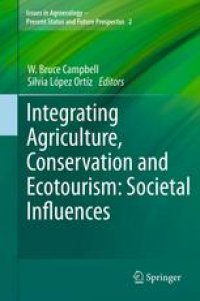
Ebook: Integrating Agriculture, Conservation and Ecotourism: Societal Influences
- Tags: Agriculture, Ecology, Environmental Management, Nature Conservation, Sustainable Development
- Series: Issues in Agroecology – Present Status and Future Prospectus 2
- Year: 2012
- Publisher: Springer Netherlands
- Edition: 1
- Language: English
- pdf
Agroecology not only encompasses aspects of ecology, but the ecology of sustainable food production systems, and related societal and cultural values. To provide effective communication regarding status and advances in this field, connections must be established with many disciplines such as sociology, anthropology, environmental sciences, ethics, agriculture, economics, ecology, rural development, sustainability, policy and education, or integrations of these general themes so as to provide integrated points of view that will help lead to a more sustainable construction of values than conventional economics alone. Such designs are inherently complex and dynamic, and go beyond the individual farm to include landscapes, communities, and biogeographic regions by emphasizing their unique agricultural and ecological values, and their biological, societal, and cultural components and processes.
Issues In Agroecology approaches this complex panorama of interrelated topics by presenting authoritative, comprehensive, and analytical reviews by leading scientists in all areas of agroecology worldwide. Authors for each review are invited and represent a collaborative mix sufficient to provide strong summaries and scholarly advances that serve as foundations for discussion leading to novel routes of research activity, application of management methodologies, and education and outreach programs. Each review represents concise and up-to-date syntheses of the rapidly growing quantity of scientific information in each chosen topic within this highly interdisciplinary field. The authors for each review assess the present status of this knowledge as to whether or not it is effectively moving toward or contributing to increased sustainability. As a part of this assessment, the authors identify inadequacies, errors, and gaps in knowledge that may be hindering or opposing sustainability objectives. For each review, the authors ultimately discuss what might be needed to bring work and programs onto a better track towards achieving sustainability. Such informed assessments of the routes to realize future potential make the series an essential part of the scientific method and a necessity for researchers, teachers, students, and field professionals when dealing with increasing global environmental and socioeconomic change. This format will make Issues in Ecology a highly citable series that is guaranteed to enlighten research teams, technology users, educators, students, and the general public on the status and advances of agroecology around the world.
Issues In Agroecology approaches this complex panorama of interrelated topics by presenting authoritative, comprehensive, and analytical reviews by leading scientists in all areas of agroecology worldwide. Authors for each review are invited and represent a collaborative mix sufficient to provide strong summaries and scholarly advances that serve as foundations for discussion leading to novel routes of research activity, application of management methodologies, and education and outreach programs. Each review represents concise and up-to-date syntheses of the rapidly growing quantity of scientific information in each chosen topic within this highly interdisciplinary field. The authors for each review assess the present status of this knowledge as to whether or not it is effectively moving toward or contributing to increased sustainability. As a part of this assessment, the authors identify inadequacies, errors, and gaps in knowledge that may be hindering or opposing sustainability objectives. For each review, the authors ultimately discuss what might be needed to bring work and programs onto a better track towards achieving sustainability. Such informed assessments of the routes to realize future potential make the series an essential part of the scientific method and a necessity for researchers, teachers, students, and field professionals when dealing with increasing global environmental and socioeconomic change. This format will make Issues in Ecology a highly citable series that is guaranteed to enlighten research teams, technology users, educators, students, and the general public on the status and advances of agroecology around the world.
Content:
Front Matter....Pages i-xix
Future Visions for Experiential Education in the Agroecology Learning Landscape....Pages 1-105
International Shifts in Agricultural Debates and Practice: An Historical View of Analyses of Global Agriculture....Pages 107-161
Sustainability Standards and Their Implications for Agroecology....Pages 163-225
Water Sustainability and Politics – Examples from Latin America and Implications for Agroecology....Pages 227-277
Back Matter....Pages 279-280
Issues In Agroecology approaches this complex panorama of interrelated topics by presenting authoritative, comprehensive, and analytical reviews by leading scientists in all areas of agroecology worldwide. Authors for each review are invited and represent a collaborative mix sufficient to provide strong summaries and scholarly advances that serve as foundations for discussion leading to novel routes of research activity, application of management methodologies, and education and outreach programs. Each review represents concise and up-to-date syntheses of the rapidly growing quantity of scientific information in each chosen topic within this highly interdisciplinary field. The authors for each review assess the present status of this knowledge as to whether or not it is effectively moving toward or contributing to increased sustainability. As a part of this assessment, the authors identify inadequacies, errors, and gaps in knowledge that may be hindering or opposing sustainability objectives. For each review, the authors ultimately discuss what might be needed to bring work and programs onto a better track towards achieving sustainability. Such informed assessments of the routes to realize future potential make the series an essential part of the scientific method and a necessity for researchers, teachers, students, and field professionals when dealing with increasing global environmental and socioeconomic change. This format will make Issues in Ecology a highly citable series that is guaranteed to enlighten research teams, technology users, educators, students, and the general public on the status and advances of agroecology around the world.
Content:
Front Matter....Pages i-xix
Future Visions for Experiential Education in the Agroecology Learning Landscape....Pages 1-105
International Shifts in Agricultural Debates and Practice: An Historical View of Analyses of Global Agriculture....Pages 107-161
Sustainability Standards and Their Implications for Agroecology....Pages 163-225
Water Sustainability and Politics – Examples from Latin America and Implications for Agroecology....Pages 227-277
Back Matter....Pages 279-280
....